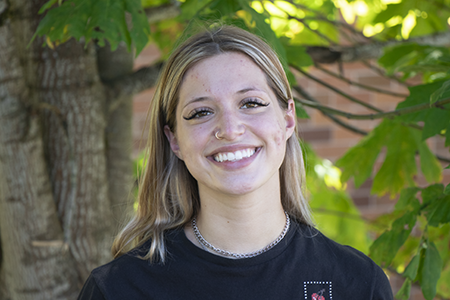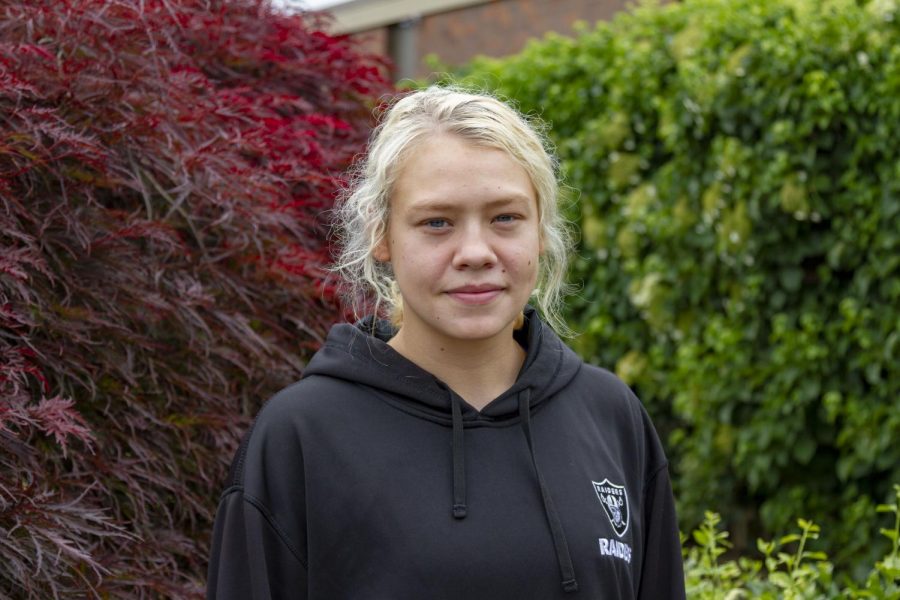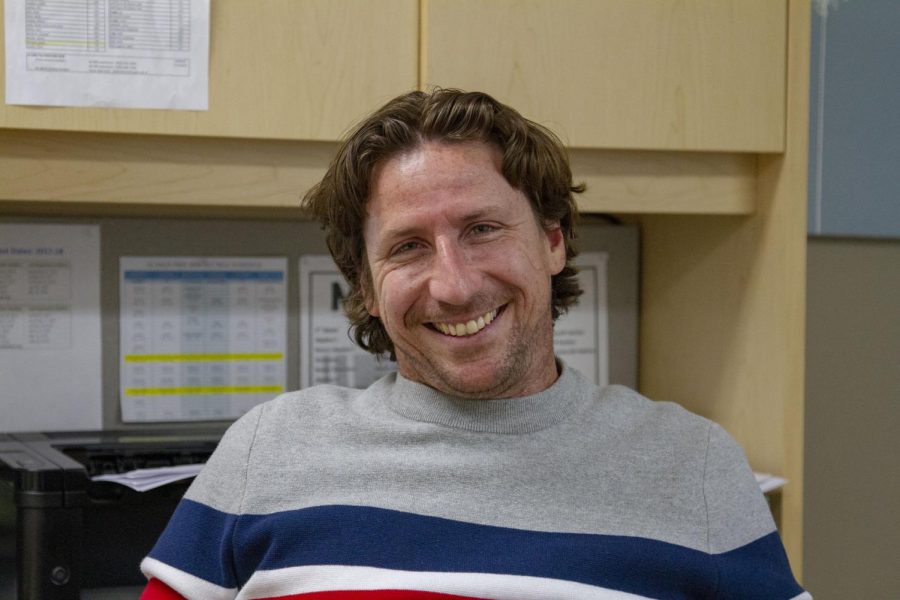
Maya is a senior at La Salle. She is on the varsity tennis team. Outside of school, she loves listening to music, hanging out with friends and family,...


June 5, 2019
Pretty much every La Salle student has experienced some level of stress in their life. This is not surprising at a college prep school, where the homework load is high, pressure from parents is intense, and many students are also involved in sports.
But for some students, this everyday stress that most experience can turn into a crippling and overwhelming anxiety, something that an increasing number of American teenagers are dealing with on a daily basis.
Recent data from the Pew Research Center reveals that “61% of teens say they feel a lot of pressure to get good grades, three-in-ten say they feel a lot of pressure to look good (29%) and to fit in socially (28%), and one-in-five feel similarly pressured to be involved in extracurricular activities and to be good at sports (21% each).”
In addition, 70% of teens said anxiety and depression is a major problem among people their age, and 55% said the same about bullying.
Here at La Salle, two of the school’s counselors, Mr. Seth Altshuler and Ms. Nancy Orr, report that anxiety is very near the top of the list for most frequently discussed topics with students, along with relationship or family issues.
“We’ve definitely seen, and I think most counselors would say this, an increase in kids feeling and reporting high enough levels of anxiety,” Mr. Altshuler said. “[Anxiety] is a big [problem for students] for sure. Certainly not just here, this is a nationwide, this is a worldwide issue, frankly, but it is especially true here in the U.S.”
Anxiety has always been a part of the teenage experience, but now it’s starting to become more prominent and detrimental to young people’s lives.
As an article from the New York Times reports, “Anxiety is the most common mental-health disorder in the United States, affecting nearly one-third of both adolescents and adults, according to the National Institute of Mental Health.”
“I think that anxiety has always been around, but I’m finding more students that are totally debilitated by it,” Ms. Orr said. “That’s the difference, they’re not able to come to school, or they need help getting in the building. I’ve gone out and sat in cars with kids till they can walk in. That’s much worse than it ever used to be.”
Mr. Altshuler gives an example of how anxiety might start to evolve over time within a student. “Let’s say you [have to] take the same math test ten times,” he said. “You could have a kid who takes it five times, totally okay, then the sixth time, it gets a little more nerve-wracking, in the seventh time even more, eighth, ninth, and it grows. Opposed to getting used to it, they get more afraid of it.”
Anxiety exists in many variations and forms. Different people experience different amounts of anxiety and in different ways.
“I see [major anxiety] showing itself in a lot of ways,” Mr. Altshuler said. “In some cases, panic attacks [occur] and legitimate body temperature changes. In some cases to the point of a mental paralysis, can’t do it, get me out of here.”
Students go and see their counselors for many different reasons relating to anxiety.
“I have three or four students right now that I check in with regularly about how they’re doing because of their anxiety,” Ms. Orr said. “And then [I have] people [who] just pop in [to tell me about what’s stressing them out.]”
There are many causes of anxiety for students, but the majority of it seems related to school and their future, Ms. Orr said.
“Kids are a lot more anxious than they used to be about grades, about friends, about their parents, [and] about college,” Ms. Orr said. “[Wondering] am I going to have enough money, am I going to have good enough grades.”
Mr. Altshuler adds that parents have a “huge role” in anxiety. “A lot of this stuff is a little bit beyond [students,]” he said. “You’re plopped in the middle of [everything] and you’re [expected] to deal with it.”

In a recent optional survey from The Falconer that 42 La Salle students participated in, many said their anxiety is caused by schoolwork, school-related stress, and social situations.
Students who participated in the survey were asked to include some basic identifying information if they wanted to, so that their responses could be quoted in this article, but were given the choice to not submit their name to stay completely anonymous. (Although this identifying information was optional, The Falconer was unable to verify the identifying information that was submitted, because the survey was otherwise anonymous.)
A freshman girl said, “I have had anxiety as far back as I can remember… it’s more of an internal struggle than an external one. My anxiety does affect the choices I make. A big chunk of my day is spent obsessing over trivial things, like ‘what if all of my friends secretly hate me?’ [or] ‘what if I’m not doing well enough in school?’ These obsessions stop me from enjoying time with my friends, my family, at school, and doing the things I love.”
A sophomore said, “I’ve probably had anxiety since 6th or 5th grade. It’s mainly been school and others around me [that contribute to my anxiety,] but also [my] personal safety… Sometimes my anxiety gets so bad that I start to have panic attacks or completely break and shut down.”
A junior boy said, “I’ve had problems with anxiety most of my life, but when I hit high school it started becoming more of a problem that keeps getting worse. [Anxiety] definitely does [affect choices I make.] Sometimes I get so stressed out and anxious I just shut down and stop doing what I’m doing, or my anxiety stops me from doing something I really want to do.”
A senior boy said, “I’ve been officially diagnosed with anxiety since I was in the third grade. Schoolwork is the main factor that affects my anxiety. Yes, [anxiety stops me from doing things I enjoy.] I have anxiety attacks and that can lead to the point of me not being able to function at all.”
For those who choose to seek out help at school, counselors use different strategies to help students who visit them with anxiety-related issues.
“[We offer] times and ways for [students] to have a safe place to decompress, sometimes [we] talk [it] through, sometimes actually letting them sit and be, sometimes they just need to disconnect,” Mr. Altshuler said.
Mr. Altshuler also tries to help students with lower levels of anxiety to face their fears and begin getting more comfortable with things that scare them.
To get a more complete sense of how anxiety affects some students in the La Salle community, The Falconer spoke at length with two students about the experiences that they have had with anxiety.
Emily’s Story

Junior Emily Niebergall plays basketball for La Salle in the winter and on a club for much of the rest of the year, which gives her the opportunity to travel and have colleges scout out her and her teammates. Niebergall has not yet decided if she wants to play in college.
Four months ago, anxiety started to affect Niebergall. It impacts things she enjoys doing, her school life, and how she performs academically.
“[My anxiety] is mostly I’ll be somewhere and everything will be fine, then I’ll just start to lose it,” she said. “[I feel like] I have to get out, I have to go, I cannot be in here anymore.”
A lot of Niebergall’s anxiety affects her when she is alone in public areas. “Even when I go to the mall, I can’t be by myself,” she said. “I don’t want to go by myself, I don’t want people to look at me, I don’t want to be just some girl alone over there by herself.”
Niebergall’s friends have been there for her while she’s been struggling with anxiety. “[They] do a really good job of [checking in on me,] but sometimes it’s just me having to deal with me,” she said.
School has been very difficult for Niebergall since anxiety started affecting her.
“My mom passed away this year, [and I have been dealing with] the stress and anxiety of [wondering] am I even going to pass [my classes,]” Niebergall said. “I can’t do my homework tonight because I’m sitting at home crying. When [we] go home, teachers expect kids to sit down and do their homework, and that’s not the reality of it, that doesn’t actually happen.”
Niebergall has connected with other girls who have also lost a parent. “You just get this connection with them,” Niebergall said. “A lot of it is [realizing] I’m not actually crazy, these people are experiencing it too… I feel like it sucks having to remind yourself you’re not crazy, because everyone else thinks you are, because [they don’t know what’s going on inside your head.]”
“There have been days where I come to school, but I can’t get out of my car and I lose it in my car,” she said. “There’s been days where I’ve had to have people come get me from my car because I can’t walk in by myself. When I do get [to school] it’s from the front doors straight to the counselor’s office… [then the] counselor’s office to the front door and then I’ll go home.”
Coming back to school after her mom passed away was very hard for Niebergall. “Most of my teachers were really understanding, but a couple of them were like, ‘when are you going to do the assignments, you’re missing them,’” Niebergall said. “I’m just thinking I can’t do them, I’m not going to do them, I can’t right now because I have too much to do at home.”
During the school day Niebergall sometimes goes to see the counselors. “I go and talk to Ms. Orr [and] Mr. Altshuler, sometimes I have to be taken out of whole class periods to talk to them,” she said. “I don’t know what else to do, and I don’t know how to handle this kind of stuff on my own.”
Niebergall feels students should have time to focus on their mental health after school and not have to become even more stressed about the work that’s due the next day.
“It’s so hard for kids to go to school for seven hours and then go home [to continue schoolwork,]” she said. “[Students] need time to [address] what they’re dealing with in their personal lives… I think that getting through the school day… is an accomplishment of its own. I know for other kids it’s the same way, [when] every day is just really hard.”
Due to the hefty amounts of work Niebergall had to make up for missing a week of school after her mom passed away, she has not had time to actually process what happened.
“I feel like our school hasn’t given me the time to take it all in,” Niebergall said. “I still don’t even have the time to believe any of it. I’m over here thinking, ‘it’s fine, she’s just on vacation somewhere.’ I don’t even have the time to process it because I’m busy worrying about [if] my math is going to get done, is my essay going to be done, am I going to get a good grade on it, am I able to go to school tomorrow?”
Niebergall believes that students struggling with anxiety and other mental illnesses should put how they feel before all else.
“Administration needs to figure out a way that kids are able to go home and deal with what they have to and not worry about [pushing it aside,]” Niebergall said. “People need to realize that you can deal with it now. Don’t worry about getting your work done all the time, deal with [how you feel] now. However you have to, it needs to be dealt with now so you can start feeling better about yourself, about school, about life, and how you perceive the world.”
Anonymous Junior Girl
One La Salle student The Falconer spoke with is a junior girl, who was granted anonymity to discuss her struggles with anxiety.
Starting freshman year, anxiety started to become more prominent in her life. “At the beginning I was nervous to meet new people and I didn’t know a lot of people at La Salle, so of course I thought that was normal for most freshmen to feel that way,” she said. “Over the course of a few months, I began to get more socially anxious, and I didn’t feel comfortable talking to people or having a set group of friends.”
She felt like people were always expected to be with their friends during the downtime between classes and during break. “I felt like I wasn’t fitting into that and I think that caused some anxiety with me,” she said.
Her schedule started getting very busy, and with playing sports she started feeling a lot of pressure. “Again, in the beginning I thought all of this [was] very normal,” she said. “I soon realized that I was changing a lot, [in terms of what] I thought and the way I functioned, [they were] not healthy.”
Soon anxiety started to affect more of her life. “My interests in going to school, or seeing my friends every day [didn’t] seem that important to me [anymore],” she said. “I just wanted to stay at home. That’s a common feeling with anxiety, you don’t want to talk to people, or you don’t want to be around people.”
People around her started to notice that she didn’t care about school as much. “My parents noticed that and I think my teacher one day noticed that I wasn’t doing my best in school,” she said.
She ended up taking a few mental health days throughout the time she struggled with anxiety. “[I] said I was sick, but it was more like I just couldn’t get out of bed, or get myself to go [to school,]” she said.
After struggling with anxiety throughout freshman year, she made changes in her life to get better, and then finally conquered anxiety altogether, she said. She started to acknowledge that she actually did have anxiety and no longer denied it.
“Ultimately, I just made decisions that were better for me,” she said. “For a long time I felt like I should be stronger than this and I shouldn’t let anxiety affect me, but then I realized it’s important to communicate [how I feel.]”
She started to open up to those around her about how she felt. “I started talking to my parents more, and when they realized they wanted to help me, [it makes you] realize that you have such a big support system,” she said.
She also started to focus more on herself, rather than others. “I was focusing on what others wanted me to do [and] what people might think,” she said. “I had to do things for myself and realize that it was my health and my happiness and not what others’ expectations were.”
Speaking about her past experiences, she said, “You have to realize sometimes certain situations don’t change, but you can. You can change how you respond, or let things go, or work for the better.”
She shared a piece of advice for others struggling with anxiety. “Anxiety is a real thing and it’s okay, you can acknowledge it,” she said. “When we talk about it, more people will [start] wanting to talk about their anxiety and how to get better with it.”
How to Get Help

There are multiple ways to start getting help for your anxiety at school, and many resources that are available from counselors.
“First thing I would do is seek out any one of the counselors,” Mr. Altshuler said. “A lot of what we do is getting [students] resources, getting [them] connected to organizations, literature, ways to study, in addition to helping [them] actually practice [facing their fears.]”
One thing Mr. Altshuler recommends is to not use Google to do a self-diagnosis. “[It doesn’t] give it enough depth,” he said. “When you’re dealing with anxiety, it really makes sense to talk to people who understand some of the approaches to anxiety.”
Counselor and psychology teacher Ms. Kerri Kelvin said anxiety can sometimes come out of nowhere, but it can also be triggered by a stressful event.
When students are suffering from severe anxiety, Ms. Kelvin has a variety of strategies to help students cope.
“I try to have them take some deep breaths, and I have stress balls,” Ms. Kelvin said. “Sometimes [I] just try to look into their eyes and… try to anchor them. Because you have to just pull them out of that fight-or-flight situation, because their brain is just in a place where they’re in panic mode.”
Ms. Kelvin believes La Salle’s counselors do a great job at helping students in the moment, and they have recommendations and courses of action for long-term changes or solutions.
“Sometimes [we all] just need a quiet place to be,” she said. “And they just need to get out of class and just be quiet and still for a little while.”

Maya is a senior at La Salle. She is on the varsity tennis team. Outside of school, she loves listening to music, hanging out with friends and family,...
Gretchen Pauli • Jun 6, 2019 at 10:20 am
Great article as always, Maya! I like how you included viewpoints from the councilers and students. Thank you for an interesting and informative read!
Nancy Orr • Jun 6, 2019 at 7:36 am
Well done Maya, I appreciate the time you spent researching this topic after our initial interview.
Mallory • Jun 5, 2019 at 10:56 pm
This article is so amazing Maya! It is so great of you for writing about such an important topic that everyone needs to know more about. You are helping shed light on the seriousness of anxiety and depression and helping others understand that they are not alone. Your work is extraordinary!!
Maddie • Jun 5, 2019 at 10:16 pm
Excellent article Maya! Very well written and I know you worked really hard on it. This article is profound and informational and I’m glad you addressed this growing issue on a community level.
Maria • Jun 5, 2019 at 9:18 pm
This is so important to hear and talk about. Thank you for writing this Maya!
Vishal • Jun 5, 2019 at 8:50 pm
This is a very important issue that many people just try to avoid. Glad someone is talking about it and bringing awareness to the situation and even adding solutions.